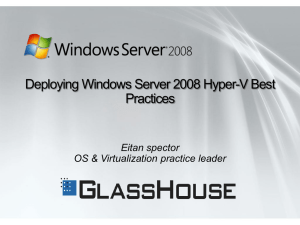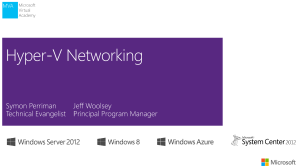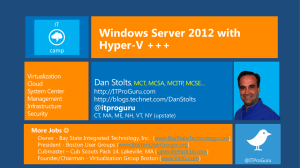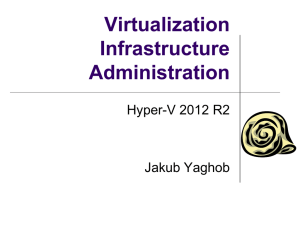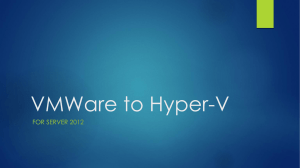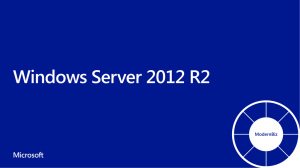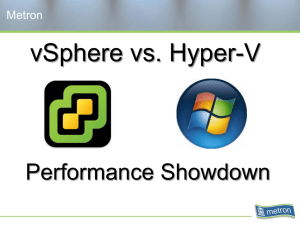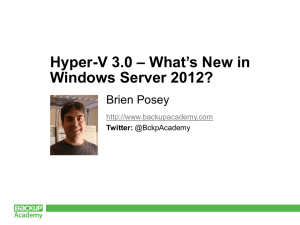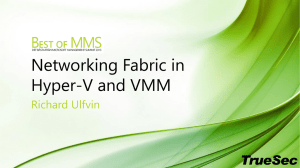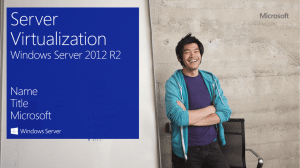Presentation Title - Hyper-V Server Blog der Rachfahl IT
advertisement
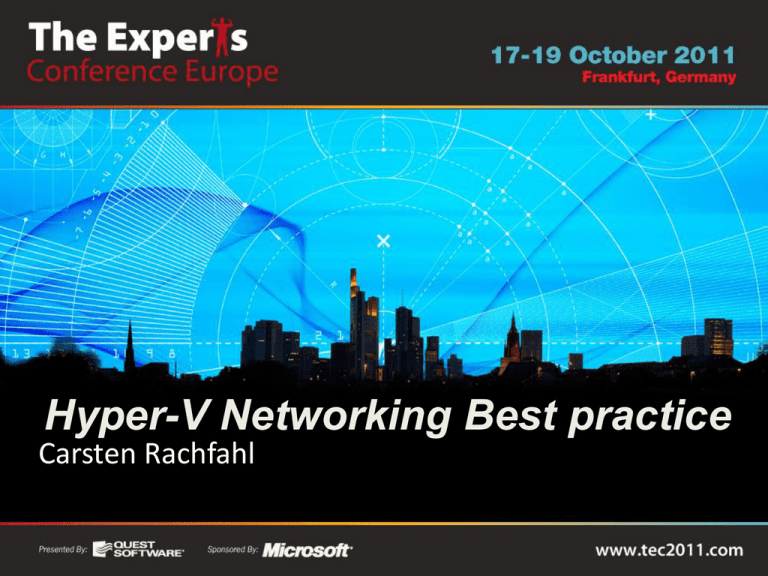
Hyper-V Networking Best practice Carsten Rachfahl About Me • Carsten Rachfahl @hypervserver http://www.hyper-v-server.de • CTO of Rachfahl IT-Solutions GmbH & Co. KG • working in IT for 23 years (experience with computer for more than 30 years) • I‘m blogging, podcasting, video casting and tweeting about Microsoft Private Cloud • Microsoft MVP for Virtual Machine Agenda • Some Hyper-V and networking basics • Networking in Hyper-V Cluster • Networking in Hyper-V vNext Why is Networking so important? • Nearly every VM need a network • Hyper-V Cluster is not really functional without a proper designed Network • I will speak about my „Hyper-V Networking Best Practices for Hyper-V R2 SP1” Provided by: Hyper-V Architecture Child Partitions Parent Partition VM Worker Processes OS ISV / IHV / OEM Microsoft Hyper-V Microsoft / (XenSource) Applications Applications Applications Applications WMI Provider VM Service Windows Server 2008 /R2 VSP VMBus Windows Windows mit Non-Hypervisor Server Integrated Aware OS Components 2008 /R2 User Mode Linux Kernel Windows Windows Kernel Windows Kernel VSC Kernel VMBus IHV IHVDrivers Drivers Emulation Windows Hypervisor “Designed for Windows” Server Hardware Linux VSC VMBus Kernel Mode Hyper-V Network Switch • „stupid“ Layer 2 Switch • three Network Types: Private Internal External Root Partition Host NIC Virtual Machine VM NIC Virtual Switch Physical NIC Virtual Machine VM NIC Physical Switch Hyper-V Networking Settings NIC Optimization • TCP Chimney Offload • Jumbo Frames (up to 9000 byte Packets) • Receive Side Scaling (RSS) • Virtual Machine Queuing (VMQ) TCP Chimney NIC Hardware TCP/IP Stack ACK processing TCP Reassembly Zero copy on receive NIC Teaming • Feature to combine multiple network connections to one logical • no native Support in Window Server • NIC Vendors must provide Teaming capabilities • Active/Active or Active/Passive configuration • Some Teaming configurations need Switch support IPv4 and IPv6 • IPv4 is fully supported • IPv6 is fully supported • Microsoft tests everything with IPv6 enabled • when you use IPv6 think about VLANs VLAN • VLAN (virtual LAN) segment traffic in a switched environment • VLAN Support for Parentpartition is set in the Hyper-V Switch • VLAN Support for VM is set on NIC Features compatibility matrix From Cristian Edwards Blog: http://blogs.technet.com/b/cedward/ Management Network • Public Network w/gateway • Normaly used for: – Backup – System Center Agents – Patching – Anti Virus – Cluster Communication • Protocol Bindings VM Network • Connect VM workload with the public network • Only for VM traffic • No Protocols bound except „Switch Protocol“ iSCSI Network(s) • private Network connect Host with iSCSI SAN Storage • Teaming is not supported • for Redundancy and Performance use MPIO • Bindings: only IP Hyper-V Cluster • Hyper-V Cluster delivers „High Availability“ • 15 Nodes with 1000 VMs • Failover in case of problems • Livemigration to move running VMs to another Host Heardbeat/CSV • Used for Cluster Communication • Used for redirected I/O • SMB Bindings needed Livemigration • Livemigration moves a running VM to an other Host • Need a „big Pipe“ • assume a VM with 4GB of Memory over 1Gbit = 8s*4 = 32s over 10Gbit = 0,8s*4 = 3,2s • Bindings Cluster Network Setting How does the Cluster know with Network to use for what purpose? • CSV:Network with lowest Metric • Heartbeat: on Cluster Network • Livemigration: Network on VM • Set the Network Order NIC balancing • Think about port distribution across different NICs • Best practice with 2 NICs: • iSCSI and iSCSI2 with MPIO pluged into different NICs • CSV Network • Livemigration use Teaming pluged into different NICs NIC balancing • VM Network use Teaming pluged into different NICs • Management Network • four Port NIC <> four NICs • What if? – right NIC fails – left NIC fails NIC balancing 2 • New Best Practice! • Management use Teaming pluged in two NICs • What if? – right NIC fails – left NIC fails 10GBit • Bigger “pipe” is always better • I prefer 10GB over NIC Teaming • Livemigration and VM Network will profit most • CPU usage! Use NIC Offload capabilities! Hyper-V Cluster Networking Hyper-V vNext • //build/ Conference www.buildwindows.com • On Microsoft Channel9 are 275 session videos • Podcast and Presentation about “Hyper-V in Windows 8” Hyper-V vNext • • • • • native NIC Teaming support in „Windows 8“ SMB2.2 Multichannel and Direct (RDMA) Single-Root I/O Virtualization (SR-IOV) vFC for Guest Cluster NIC Offloading: – Dynamic VMQ (D-VMQ) – Receive Segment Coalescing (RSC) – IPsec Offloading Hyper-V extensible Switch Unified tracing / Port Mirroring Network Virtualization VM Mobility PVLAN Port ACLs + DHCP Guard Minimum and Maximum Bandwidth • Extensible through 3rd party vendors – – – – – Cisco Nexus V1000 Switch 5nine vFireWall with Antivirus inMon sflow Traffic Monitoring NEC OpenFlow for Hyper-V Broadcom Hyper-V Switch Extension Host NIC VM NIC Virtual Switch Extension Protocol Capture Extension Extensions WFP Extensions Extension Extension Filtering Extensions Extension Forwarding Extension Extension Miniport Physical NIC Virtual Machine VM NIC Egress Traffic – – – – – – Virtual Machine Root Partition Ingress Traffic • Many enhancements Where to learn more? On our blog you will find an post with more information's about this talk http://www.hyper-vserver.de/TECconf
